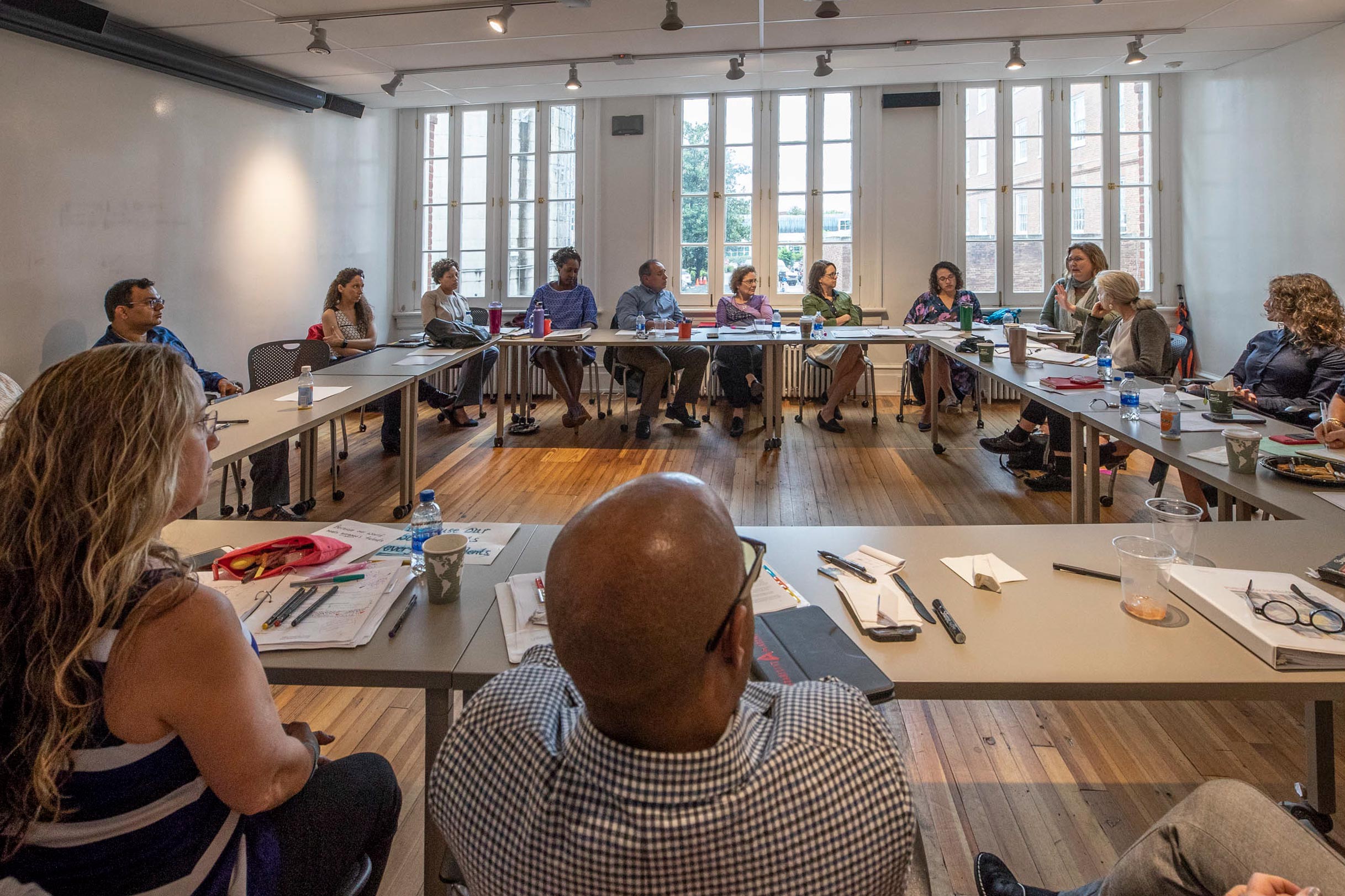What do Beyoncé, the Super Bowl, astrophysicist Barbie, refugees, the opioid crisis and white supremacy have in common?
All are among the topics a select group of University of Virginia faculty members have written and published articles about in the past few months.
For the most part, their articles did not appear in journals narrowly devoted to their concentrations in research and scholarship, but instead in major newspapers and media outlets for broad public audiences, including USA Today, Washington Post, U.S. News & World Report, and a range of other publications. The articles addressed topics that matter to these faculty members about some of the most stubborn problems in today’s world.
UVA’s offices of the Provost and of the Vice President for Research have partnered with The OpEd Project to bring its Public Voices Fellowships program to Grounds. As a result, 20 UVA professors spent part of the past academic year exploring how to write opinion pieces for a wider public audience, using their wealth of knowledge and unique perspectives.
The program aims to increase the diversity of voices contributing their expertise from research and scholarship to public forums that help shape our culture and politics.
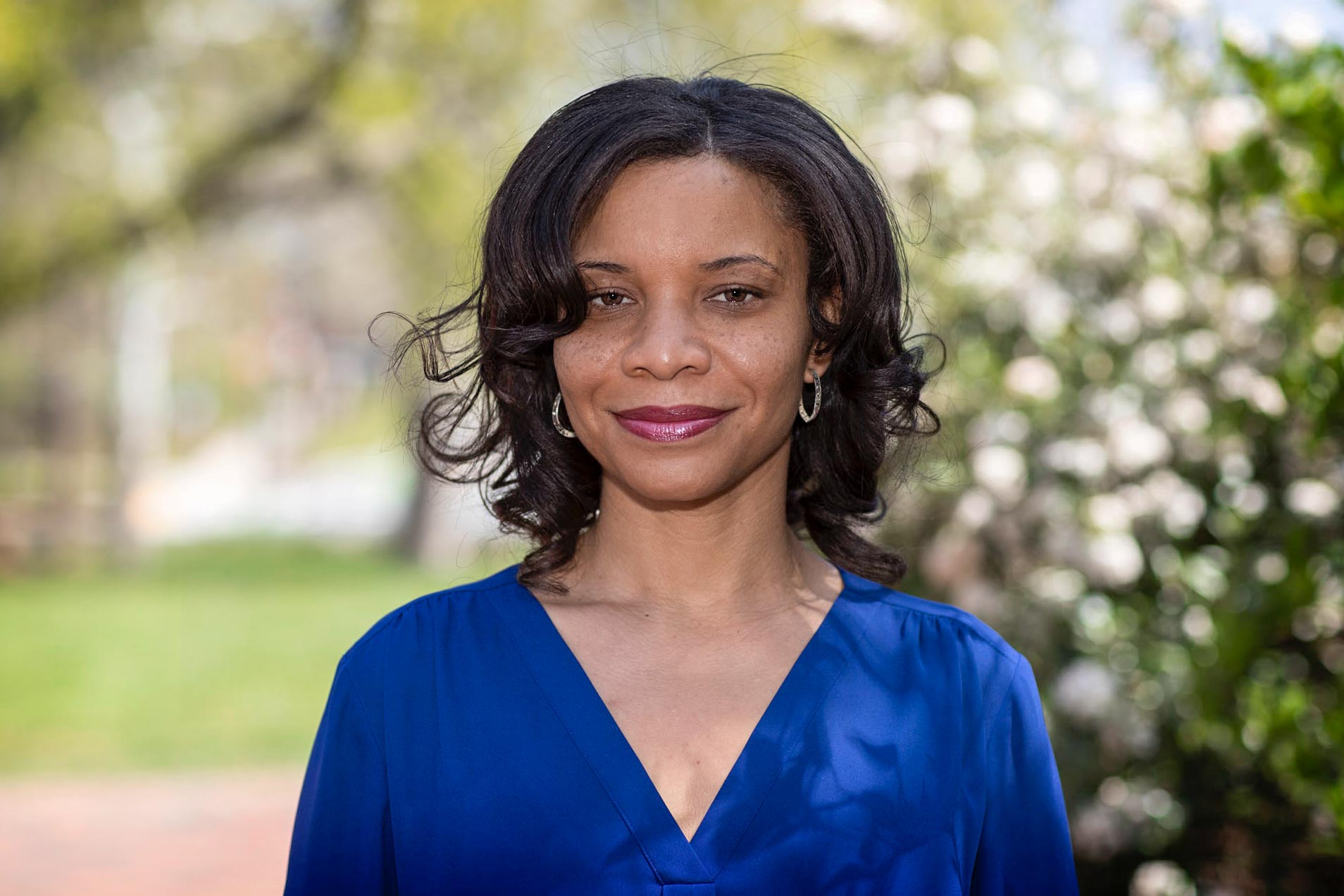
Associate professor Talitha LeFlouria was instrumental in bringing the Public Voices Fellowships program to UVA. (Photo by Dan Addison, University Communications)
The program also helps give voice to women and people of color currently underrepresented in opinion sections of print and online journalism and other media. According to The OpEd Project, a sample of major news outlets shows that 80% to 90% of op-ed submissions come from men. Likewise, men still dominate the ranks of media commentators (80% male); Wikipedia contributors are 87% male, and most of them are also white. Pundits on Sunday TV talk shows are 84% male, and 90% white, according to data from the project.
The OpEd Project runs several programs for individuals and institutions, including universities and foundations, that help scholars brainstorm ideas, work with experienced journalist-mentors, practice writing opinion pieces for a broad audience and contribute to a range of media venues.
At UVA, the offices of the Provost and the Vice President for Research convened a committee that selected the first cohort of 20 fellows, with Talitha LeFlouria, Lisa Smith Discovery Associate Professor in the Carter G. Woodson Institute for African-American and African Studies, and biomedical engineering professor Silvia Salinas Belmker as co-directors of UVA’s program. LeFlouria had learned of the program from a colleague, Daina Ramey Berry of the University of Texas at Austin, and previously attended a one-time workshop.
The yearlong fellowship includes four all-day seminars during which the faculty fellows develop ideas to write about, think about the purpose and impact of sharing their views, and learn writing tips, such as using concise, but more general language than they would use in their disciplines. Experienced journalists lead the workshops and provide one-on-one mentoring. They also help the fellows reach media outlets and influential forums.
Francesca Fiorani, an art history professor and former associate dean for the arts and humanities in the College and Graduate School of Arts & Sciences, helped shepherd the proposal for the program and was so impressed that she joined it herself during her research leave for 2018-19.
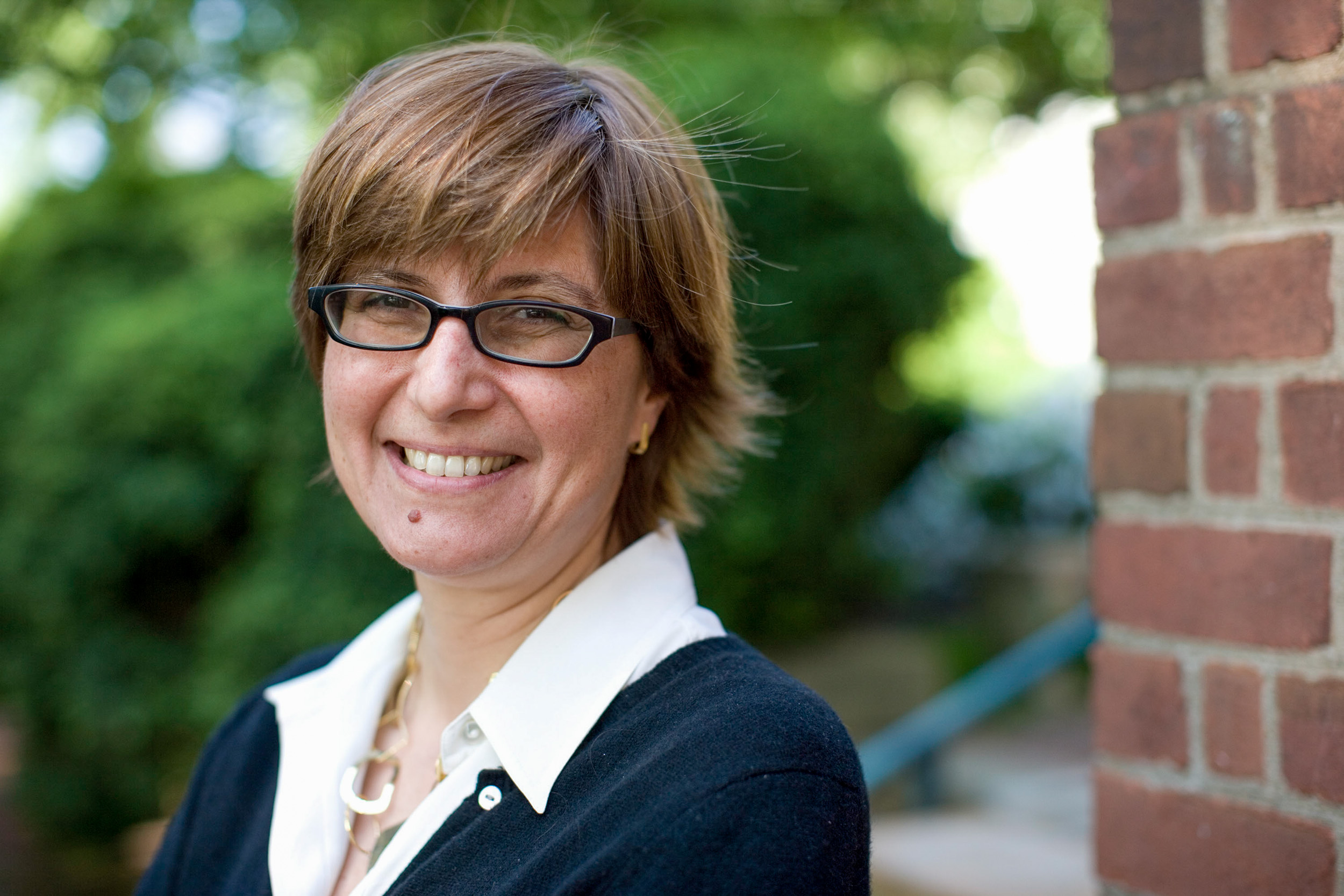
As associate dean for the arts and humanities, Francesca Fiorani, an art history professor, helped get sponsorship for the program from the offices of the Provost and the Vice President for Research. (Photo by Dan Addison, University Communications)
“It sounded really interesting,” said Fiorani, who has since stepped down from the administrative post. “Very serious and, most important of all, it seemed to me deeply aligned with stated goals of the institution: to increase research output, further elevate the public role of the University, and support and develop our stellar faculty.
“As faculty, we know how to share our new knowledge with our peers and colleagues in specialized forms (books, articles, conferences, etc.),” Fiorani said. “We also know how to share it with our students in the classroom. But not all of us know how to share and communicate our knowledge and insights with the broad public. That requires different skills.”
For Blemker, the other co-director, the program reinforced feelings she’d had about “making positive change and doing good in the world.”
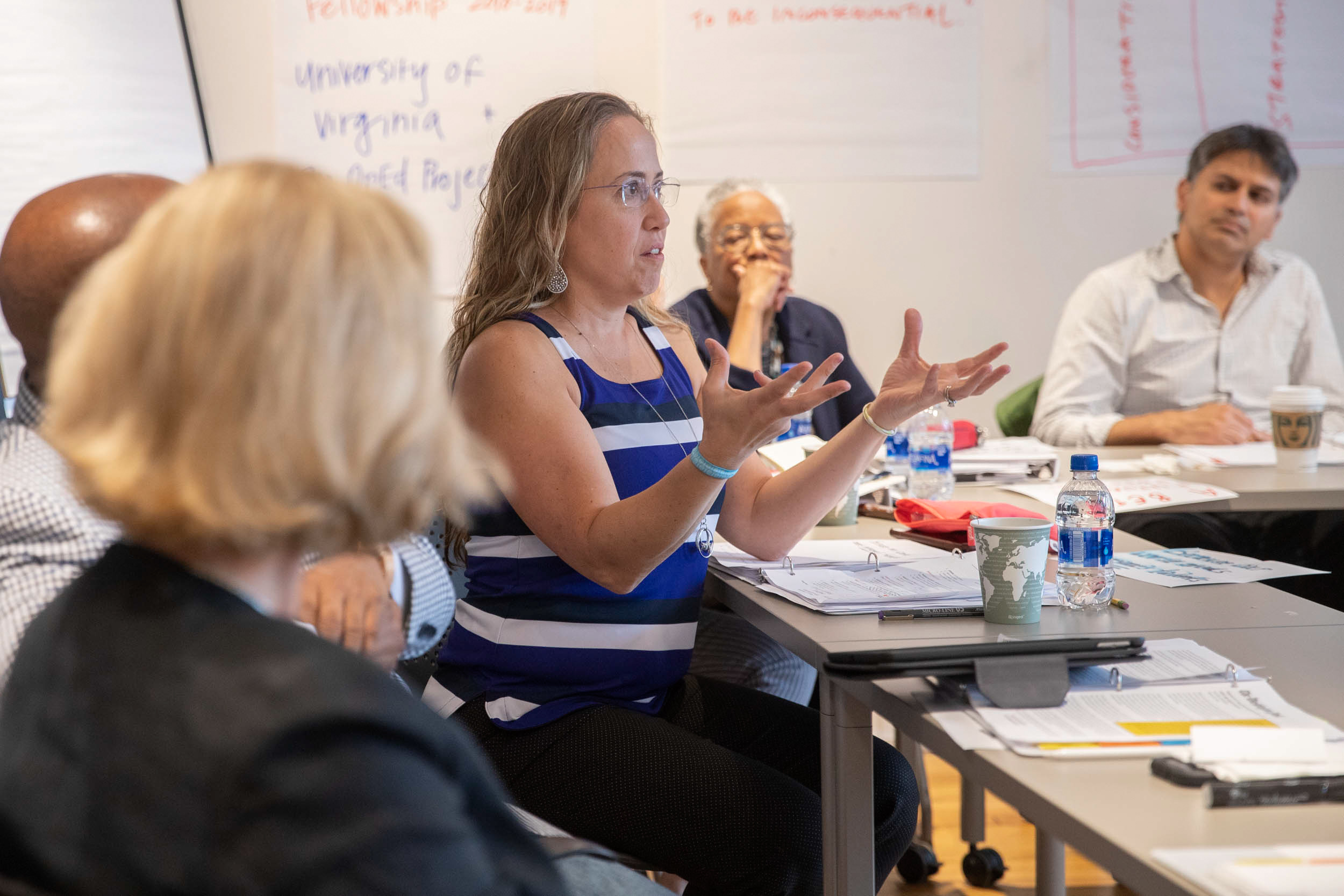
Biomedical engineering professor Sylvia Blemker, co-director of the UVA Public Voices Fellowship program, said working with mentors and colleagues was encouraging and uplifting. (Photo by Sanjay Suchak, University Communications)
“As a faculty member, I spend most of my time thinking about how to disseminate research to my peers in the scientific community,” she said, “but I had been yearning to cast a wider net about what we scientists do. The message from The OpEd Project is we need all voices.
“I’m motivated to increase the number of women and diverse individuals in academia and in engineering,” she said. “It’s important to society. I wanted to learn how to communicate that to a broader audience.”
Blemker said her OpEd Project mentor, award-winning journalist Lauren Sandler, was very helpful and encouraging, as was the whole group of fellows. Blemker described the whole experience as “very uplifting.”
Sandler’s work has appeared in dozens of publications including Time, The New York Times, Slate, The Atlantic, The Nation, The New Republic and The Guardian. She has been on staff at Salon and at NPR, and has taught in several journalism programs.
The other mentor and facilitator who worked with the UVA group, freelance journalist Angela Wright-Shannon, has been a reporter and editor at the Charlotte Observer. She also worked for Ronald Reagan’s administration and the National Republican Committee.
This inaugural group reflected a range of UVA schools and different disciplines, including African American and African Studies, art history, chemistry, economics, English and psychology from the College, as well as faculty from the Architecture, Education, Engineering, Law, Medicine and Nursing schools. They produced and published more than 30 opinion pieces in the 2018-19 fellowship year. A few examples of their success show the range of topics they’ve addressed. (A list of the fellows can be found below.)
“This gave me a view of what great people we have – our colleagues all around the University – and the fantastic work they’re doing,” Blemker said – a response other participants echoed.
Blemker wrote about women in engineering and academia, and specifically how the perfectionism expected of women restricts their ability to take risks and feel confident.
“The mentors taught us to make use of news hooks,” she said. “Then astrophysicist Barbie came along – and it was perfect, no pun intended.”
Blemker changed the beginning of her article, and USA Today published her op-ed, “Astrophysicist Barbie is perfect. That’s not how you attract more girls to STEM careers.”
“Women expect unachievable, unreasonable Barbie-perfection of ourselves, leading us to fixate on our imperfections,” she wrote. “And, if we are not careful, this fixation can prevent us from taking risks, recognizing our achievements, finding our passions, and opening our minds to discover the gifts that we have been given and seeking our purpose in life.”
Fiorani, an expert in Renaissance art, reviewed a recent music video by Beyoncé and published her piece with Garnet News. She wanted to comment on how the artist “is making some pretty remarkable claims on Western art, including that that tradition is as much hers as anybody else’s. It’s a powerful message.
“It’s thanks to the OpEd program that I was actually able to write down my thoughts the way I did and communicate them to a much broader audience than my scholarly peers,” she said.
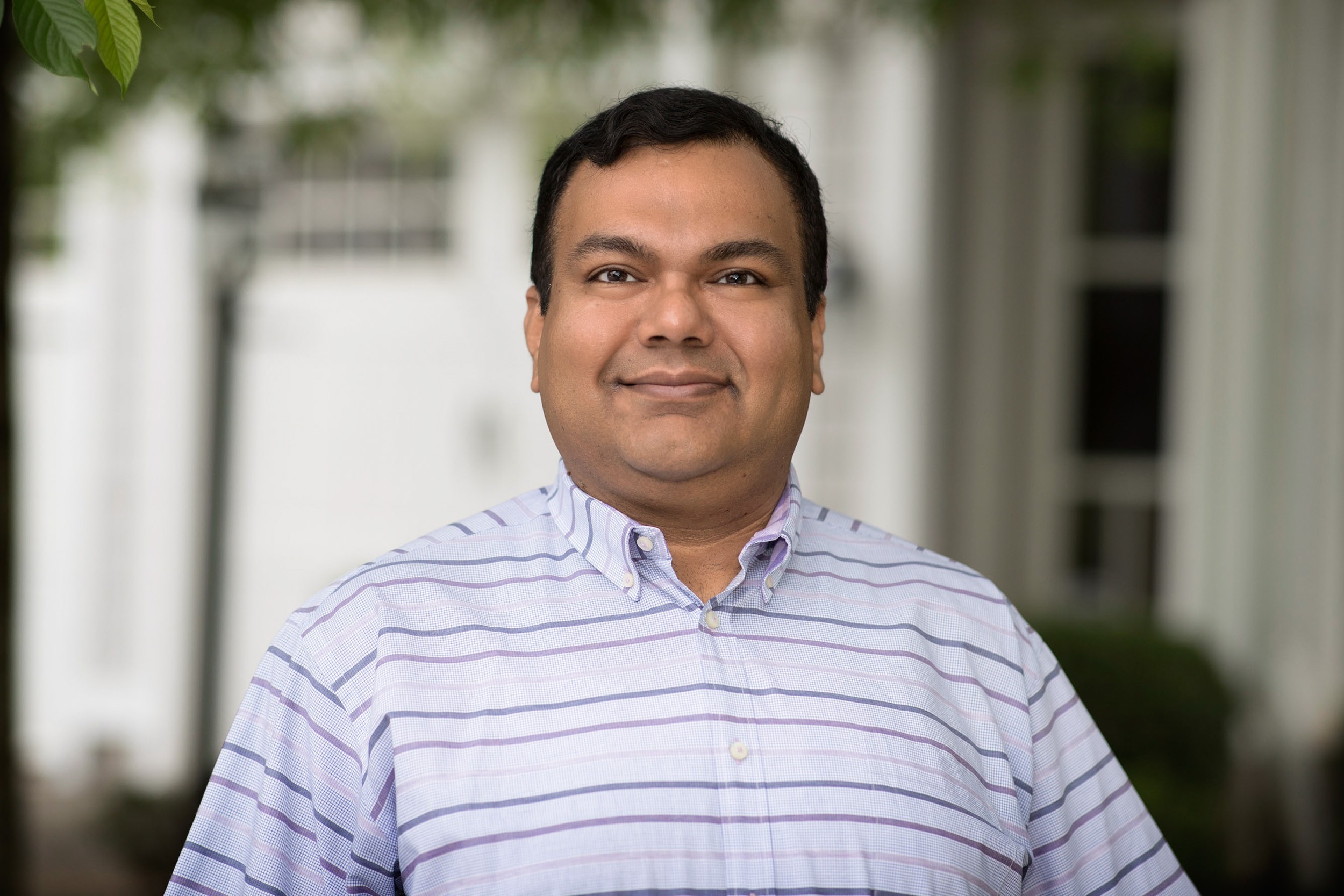
Rajesh Balkrishnan, an epidemiologist and professor of public health sciences at the UVA Cancer Center, called the program “a life-changer.” (Photo by Dan Addison, University Communications)
Rajesh Balkrishnan, an epidemiologist and professor of public health sciences at the UVA Cancer Center, called the program “a life-changer.”
He directs a team of experts, the Cancer Control Core, that supports research on community-based and telehealth services. Balkrishnan’s op-ed, “Beating breast cancer only to die of opioid use – a sad Appalachian story,” was first published in The Conversation, and then reprinted by U.S. News & World Report.
Balkrishnan also wrote a different piece about the stresses of a research career and how taking time off to pursue a hobby ended up helping him feel more confident about his work.
Noelle Hurd, Scully Family Discovery Associate Professor in Psychology, had several articles on white supremacy published in online news outlets. Like other participants, she said she plans to continue to write op-eds and “to use the concepts learned through this program to more effectively communicate my ideas across a range of formats.”
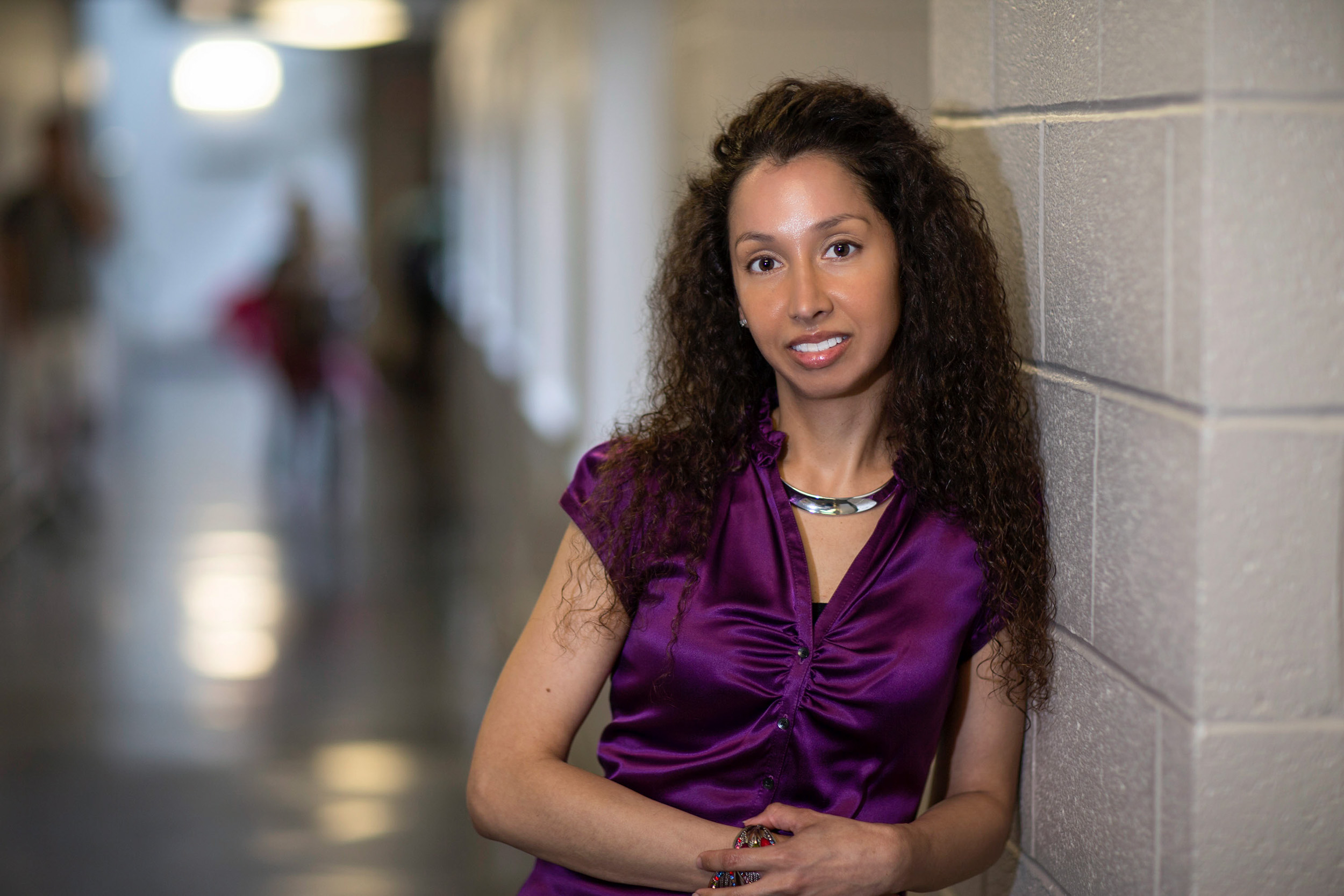
Psychology professor Noelle Hurd said she “learned the ways to leverage my expertise and conceptualize my audience so that my ideas would have increased chance of being received.” (Photo by Dan Addison, University Communications)
“I teach a course on structural determinants of inequality and conduct research on racial discrimination,” Hurd said. “Thus, I have a more comprehensive understanding of the ways in which a white supremacist ideology is fundamental to the creation and maintenance of unequal outcomes in our society.
“This project emphasizes the important contributions that women and people of color have to make and works intentionally to create space for their ideas,” she said. “Those of us who hold marginalized identities often have received messages that we do not deserve to have our voices heard or that our ideas do not matter. This strategy is a way for the privileged to retain their power. Using our knowledge and expertise to actively challenge this hierarchy in public formats can disrupt harmful narratives and help pave the way to a more equitable society.”
Fiorani reflected on the potential impact of the program, which has been renewed for next year.
“The OpEd Project helps faculty develop those skills that make it possible for them to take on that public role, teaching them how to be effective in short, relevant pieces meant to influence public opinion,” Fiorani said.
“By expanding the public profile of our faculty, we expand the impact and dissemination of their research, which in turn means to expand the reputation of the institution as a whole, both the reputation of its research, but also the reputation of its public role,” Fiorani said.
The provost’s office will send out a call for applications for 2019-20 fellowships soon.
2018-29 Public Voices Fellows
- Derrick P. Alridge, professor of education, Curry School of Education and Human Development, and an affiliate professor in The Carter G. Woodson Institute for African-American and African Studies.
- Rajesh Balkrishnan, professor of public health sciences, director of Cancer Control Core at the UVA Cancer Center.
- Silvia Salinas Blemker, professor of biomedical engineering, with joint appointments in mechanical & aerospace engineering, orthopedic surgery, and ophthalmology.
- Marlene L. Daut holds a joint appointment as associate professor of African diaspora studies in the Carter G. Woodson Institute for African American and African Studies and the Program in American Studies.
- Dr. Rebecca Dillingham, associate professor of infectious diseases and director of the Center for Global Health.
- Francesca Fiorani, professor of art history.
- Cassandra Fraser, professor of chemistry, biomedical engineering and School of Architecture.
- Dr. Fern Hauck, the Spencer P. Bass M.D. Twenty-First Century Professor of Family Medicine and professor of public health sciences.
- Noelle Hurd, the Scully Family Discovery Associate Professor in Psychology.
- Kelsey Johnson, professor of astronomy, director of the Echols Scholars Program, and founding director of the Dark Skies, Bright Kids outreach program.
- Randy A. Jones, professor, School of Nursing.
- Talitha LeFlouria, Lisa Smith Discovery Associate Professor in the Carter G. Woodson Institute for African and African-American Studies.
- Angeline Lillard, professor of psychology.
- Suzanne Morse Moomaw, associate professor of urban and environmental planning, and director of the Community Design Research Center at the School of Architecture.
- Mildred Wigfall Robinson, Henry L. & Grace Doherty Charitable Foundation Professor of Law.
- Dr. Arturo Saavedra, Kenneth Greer Endowed Professor and chair of Dermatology, School of Medicine.
- Lois Shepherd, Peter A. Wallenborn Jr. and Dolly F. Wallenborn Professor of Biomedical Ethics; director of the programs in law and medicine at the Center for Biomedical Ethics and Humanities; professor of public health sciences; professor of law.
- Sandip Sukhtankar, associate professor of economics.
- Ishan C. Williams, associate professor, School of Nursing.
- Lisa Woolfork, associate professor of English.
Media Contact
Article Information
May 2, 2019
/content/having-their-say-fellowships-help-faculty-spread-their-ideas-broader-public

